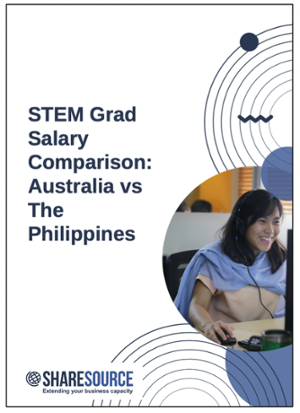The impact of the COVID-19 lockdown on cash reserves is making it challenging to keep on track with business milestones. You’ve been slowed down by months - the longer you can make your funding last, the more you can use the cash you have to grow and thrive post-COVID-19. You need a solution fast - and offshoring could well be it. Quite simply, it reduces the amount of money you spend every month and brings your costs down - essential during these challenging times.
Fundamentally, the main advantage of hiring a remote team member in a developing country like the Philippines is that you can save between 50% (at the senior level) and 70% (at the junior level) on your salary expenses. Obviously this saving will directly impact your expenditure - with the knock-on effect of making your runway longer and averting the need to source debt or capital raise. Clearly, this substantial saving can enable you to grow faster.
COVID-19 has shown that not everyone needs to be in the same office to be managed efficiently - good communication and collaboration can still be maintained and results achieved. Resistance to offshoring may be historical due to technology not being good enough - or the staff not having been culturalised to the needs of the business. However the offshoring industry has evolved significantly over the last five to ten years, to the point where senior tech talent with five to ten years experience with reputable international companies is widely available. They understand how businesses work, their skills are high level and their experience is akin to someone working in London for example.
Another major advantage of hiring an offshore team member is that the talent market is much bigger - if you go global you get more choice - it’s that simple. Outside the top 1% of STEM graduates instantly poached by the likes of Google and Microsoft, there are still many really smart and highly motivated people available - they just don’t all necessarily live within commuting distance of your office. Our experience shows that STEM graduates in developing countries tend to be much more highly motivated than their average counterparts in places like London or Sydney. This flows from a different world view and a much greater hunger for success given the fewer employment opportunities available, as well as vastly different socio-economic circumstances. Add to this the fact that you will be empowering and growing super smart and hugely talented graduates in the developing world and you also have a compelling CSR and social enterprise benefit to consider.
When considering a combination of offshore and onshore staff during the COVID-19 recovery period, it is vital that the onshore team be on board with the idea of building an offshore team. Roll-out of an offshored team must be managed in a carefully articulated way to ensure buy-in from everyone. There may be a need for a frank reality check if it’s a business survival issue - existing staff need to understand it is a necessary process due to a runway issue or no funding in the coming year. The alternative could be job losses or going out of business. Everyone needs to understand that offshored staff will work closely with them and bring talent and effectiveness to the table - they will just be more affordable. Historically they may believe you need everyone in the same room for processes to work. The good news is that everyone will know from recent remote working experience themselves that this is simply not true. A collaborative culture with regular communication (daily huddles being a cornerstone) is just as effective as everyone being in the same office.
Risk factors to consider with offshored staff include potentially recruiting the wrong person (though this can happen in any environment) as well as inadequate training and not giving offshored staff the right tools to do their job properly. It is also important to remember that offshored staff need to be engaged fully to ensure staff retention. Include them in onshore culture and make them feel like they’re truly a part of your team. A collaborative, communicative, learning culture is essential to the success of offshored staff.
STEM graduates are a particularly valuable offshore asset not least as demand for their sought-after tech skills far outweighs supply globally. Combine their super-smart, fast-learning, self-starting attitude with the right culture of empowerment and you have people with the ability to build and add value to your company.
Whilst there are no hard and fast statistics, most would agree that the COVID-19 economy is not investment-friendly and that it’s likely to become much harder to get funding over the next six to twelve months. Bottom-line savings can be achieved and your runway increased by adding offshore talent in the mix. More choice and flexibility than ever before gives you the opportunity to not only grow but thrive in the post-COVID-19 economy. Rather than hold back or even shrink like some of your competitors may do, savings made through using offshore talent will allow you to use your cash smarter and win market share.
Check out this comparison of Australia versus the Philippines STEM graduate salaries to understand exactly the impact offshore talent can make to your business right now. This download will help you understand the cash savings you can make taking on offshored STEM talent - which can be reinvested back into your business, fuelling your growth.



